

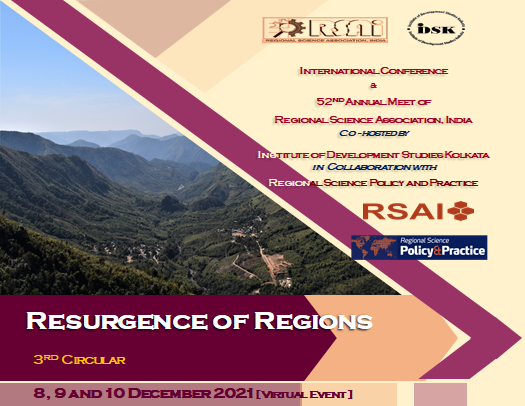
International Conference & 52nd Annual Meet of
Regional Science Association, India
Co-hosted by
Institute of Development Studies, Kolkata
in Collaboration with
Regional Science Policy and Practice
RSAI NYT Workshop: 08th December 2021
Main Conference: 09th and 10th December 2021
We invite a concise and factual abstract of 300 words highlighting the research
problem, data, methods, and major findings. References should be commonly
avoided in the abstract. Kindly follow the following format for preparing the
abstract. Submit abstract at rsai.conference@gmail.com
Abstract Submission (Extended): 30th November 2021
Registration Deadline: 4th December 2021
Delegates interested in submitting their full papers are requested to do so by January 30, 2022.
To register for the conference kindly fill-up the following form: https://forms.gle/DZs66yTYvDKyZYTT8
Please pay the registration fees before filling up the registration form and uploading the payment receipt.
Online Participants:
Members of RSA India: INR 800/-
Non-members: INR 1000/-
Registration Fees to be Sent by Bank Transfer Only
Account Details:
Name of Bank: State Bank of India
Branch: Bikash Bhavan, Salt Lake
Account Name: Regional Science Association India
Account No: 37364653656
IFSC : SBIN0007816
Swift Code: SBININBB
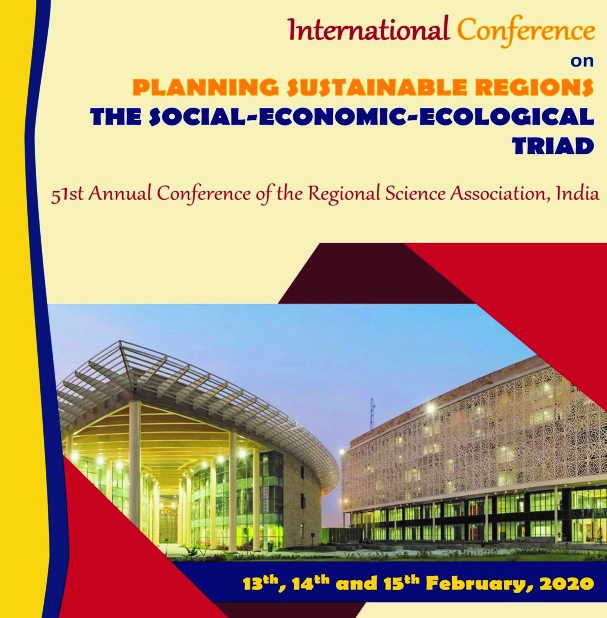
The 51st International Conference of the Regional Science Association will be hosted by Amity Institute of Environmental Sciences and Amity Institute of Social Sciences of Amity University, Kolkata on 13th, 14th and 15th February, 2020. The conference is open to regional scientists, practitioners and researchers in the field of regional science. It will include Keynote Lectures, Plenary and Scientific Sessions.
The Background
In the broadest sense, any social science analysis that has a spatial dimension is embraced by regional scientists. As a subject, it was initiated in 1940’s by economists who were dissatisfied with the level of regional economic analysis, led by Prof. Walter Isard and his supporters to promote the "objective" and "scientific" analysis of settlement, industrial location, and urban development. Isard targeted key universities and campaigned tirelessly. 2019 was his 100th birth anniversary and we hope to continue celebrating his works in the 51st anniversary of the Regional Science Association.
The Regional Science Association in India (RSAi) was born in 1964, when Prof. Isard visited the IIT Kharagpur in India and has been carried forward by Prof. Chitta Ranjan Pathak who has led its development through the last 50 years. Its biannual journal, Indian Journal of Regional Science has been published since 1967. Over the last 50 years, RSAi Annual conferences (both national and international) have been hosted by eminent institutions across India including IIT's, IIM's, Mumbai, Baroda, Nirma, Calcutta, Tripura Universities, School of Planning and Architecture to name a few. As a befitting Golden Jubilee celebration, RSA India was selected to host the 12th World Congress of Regional Science Association International, The first World Congress was held at Harvard University in 1980 and its 12th at Goa, India.
All the applicants are requested to fill up the registration form using the link:
https://docs.google.com/forms/d/e/1FAIpQLSdXOYWdC7Ei2W9mGwlNFeSsUYst2iE_GuDbAPBK8zhCf7qcew/viewform
To know more download the brochure below.
Download Now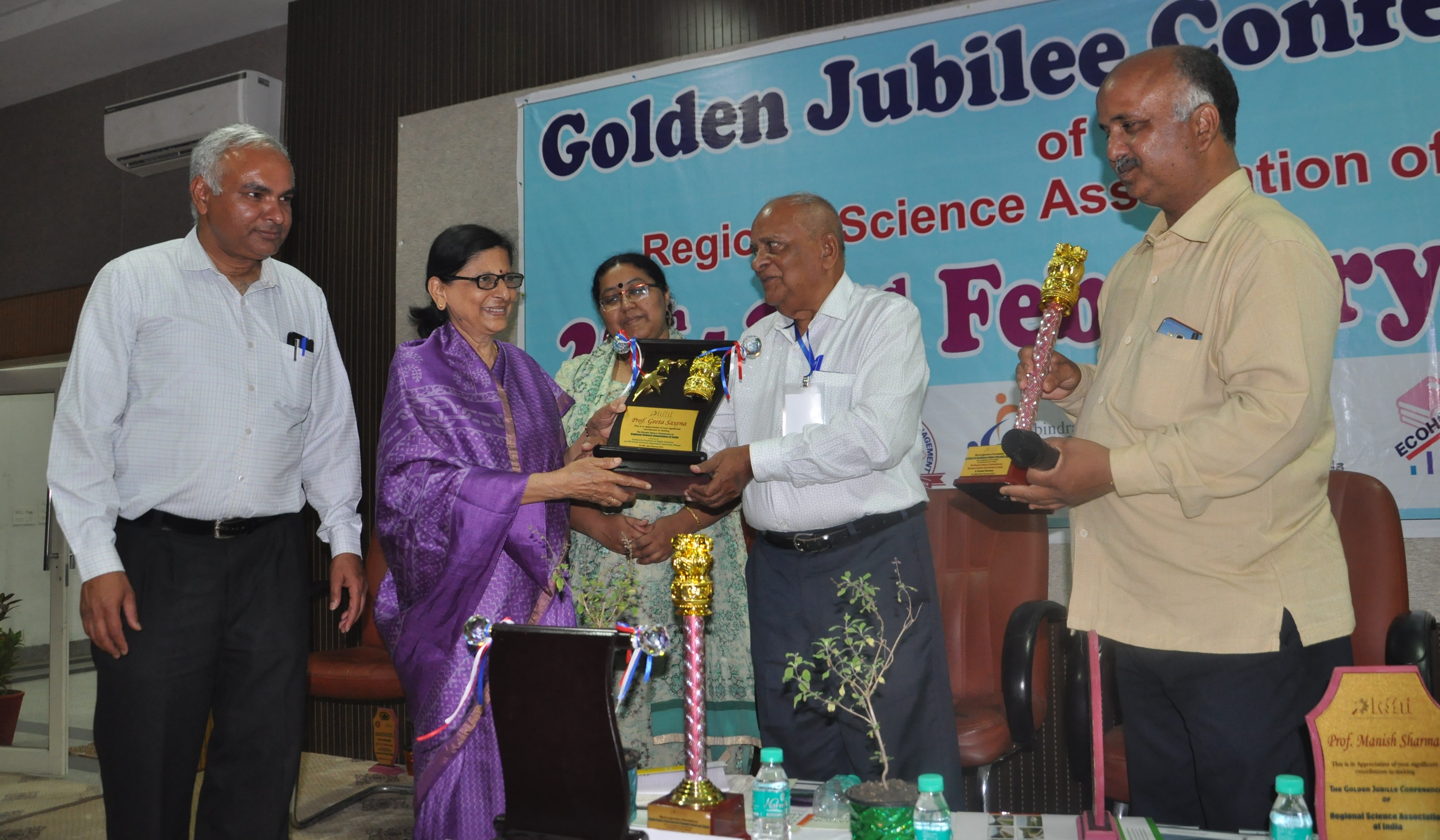
The Golden Jubilee conference of Regional Science Association of India was held in collaboration with Excellence in Higher Education(IEHE), Bhopal and Madhya Pradesh Private University Regulatory Commission (MPPURC), Bhopal, on 20-22 February 2019.
United Nation publishes Global Sustainable Development Report (GSDR) which aims at the High Level Political Forum. Science-policy interfaces refer to the many ways in which scientists, policy-makers and other stakeholders link up to communicate, exchange ideas and jointly develop knowledge to enrich policy and decision-making processes and research (Young, J.C., et al.). The 2015 GSDR underlined the importance of utilizing these linkages to identify emerging issues across the whole spectrum of sustainable development, including its social and economic dimensions (United Nation). This whole spectrum of sustainable development comprises of issues such as social and environmental paradigm of sustainability, expansion of urbanized regions, changing composition of informal sector of economy and many others.
The focal theme was on Emerging Regional Issues and Sustainability , with a view to provide new light on the complexity and interconnectivity of emerging issues, in the process strengthening the science policy interface and possibly leading to more timely responses to emerging threats or the exploitation of new opportunities. The regular scanning and multidisciplinary analyses of emerging issues from different levels and perspectives is important and should be maintained as a necessary and useful early warning system for the science policy interface. There is scope for enhanced dialogue between scientists, social scientist and policy-makers in considering both the processes by which emerging issues as well as the substantive character of issues that – out of the plethora ofeme rging issues (UNGSDR).
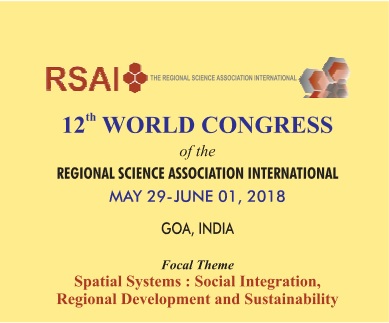
The Regional Science Association International (RSAI) and the Regional Science Association of India (RSAi) had invited regional scientists, economists, economic geographers, urban planners, policy makers, and researchers of related disciplines to participate in the 12th World Congress of the Regional Science Association International, with the main theme "Spatial Systems: Social Integration, Regional Development and Sustainability". The Regional Science Association of India had hosted the World Congress and the 49th Annual Conference of the RSAi in Goa, India, on May 29 - June 01, 2018.
The conference was open to regional scientists, practitioners and researchers in the field of regional science. The Congress includes Keynote Lectures, Scientific Sessions, Poster Sessions, Workshops and Themed Sessions. Field trip was organized in and around Goa. The theme has been chosen to focus upon the development needs of regions as spatial entities, which is the subject matter of spatial science. The conference had encouraged the environment for researchers across the globe, to interact and learn from one another, and to create a network that will be attractive and inspiring for young students and scholars. The intention was to strengthen the community of regional scientists and to achieve a better understanding of our future needs.
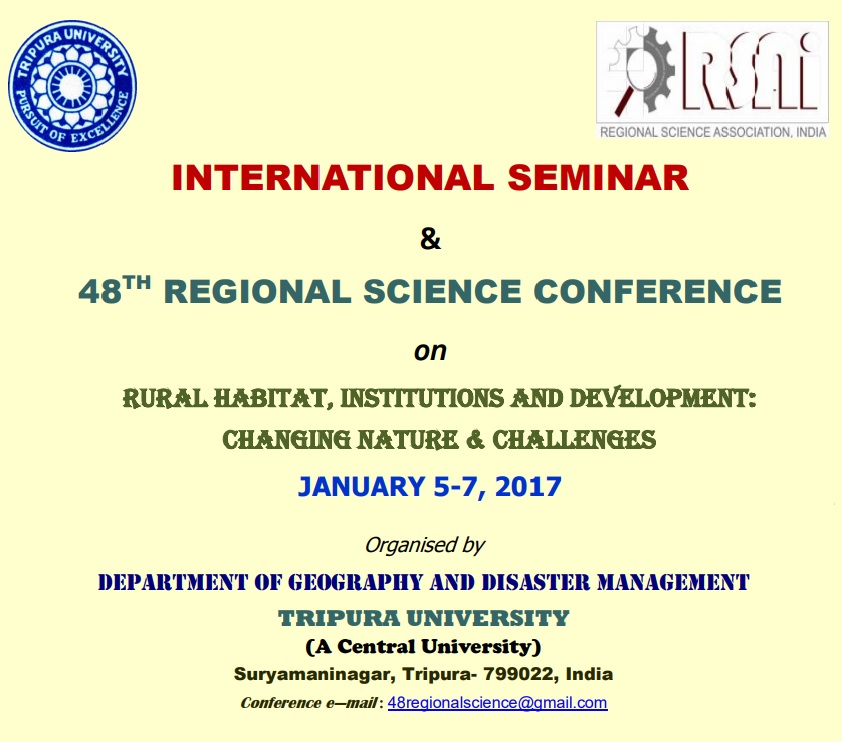
The Department of Geography and Disaster Management, University of Tripura, Agartala and the Regional Science Association, India hosted the International Conference of the 48th Regional Science Association, India.
The theme of the conference was Rural Habitat, Institutions and Development: Changing Nature & Challenges, to provide a platform to address, share and debate on the issues concerning the rural world.The approach was to uplift rural habitat varied in response to selection of time, space, economic ability and socio-cultural stages. Till date, there is absence of universally agreed outlook for rural development, which encompasses the development of agriculture and allied activities, village and cottage industries and crafts, socio-economic infrastructure, community services and institutions aimed at improving the people’s dwelling in rural areas. The United Nations postulated that the rural development is a process of change, by which the efforts of the people themselves are united which enable them to contribute fully to national programme.The growth and progress of a nation can be evaluated on its achievements of rural development policies and programmes.
Venue:Department of Geography and Disaster Management, Tripura University Campus, Suryamaninagar, Tripura, India
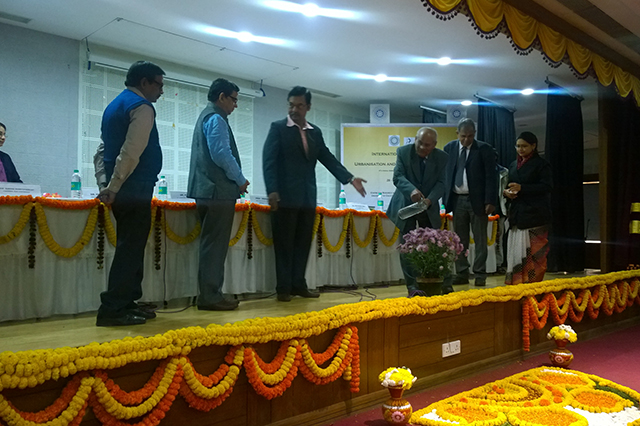
The Department of Geography and the Regional Science Association of India hosted the International Conference of the 47thRegional Science Association, India. It was also the Platinum Jubilee of the Department of Geography, University of Calcutta.
The theme of the conference was Urbanisation and Regional Sustainability ,with a focus upon the ongoing debates in contemporary crisises of development concentrating upon the urban economy. While the crisis adapts varied dimensions, the emphasis was to bring out the major issues in the current trends of growth that concern researchers in the field of regional science. The concerns on green growth and de-growth have led to the paradigm shift from traditional growth-development approaches and the need for understanding the political economy that overshadowed purely economic or social concerns. The geographers are seeking to crystallise their subject matter and question the very notion of “what constitutes geography?” as the interdisciplinary horizons widen. The intention was to bring such debates to the table and have fruitful discussions that help to identify boundaries and opine on the present issues as social scientists and spatial scientists. Venue:The CRNN (technology campus), University of Calcutta, Acharya Prafulla Ray ShikshaPrangan JD 2, Salt Lake, Kolkata- 700 098